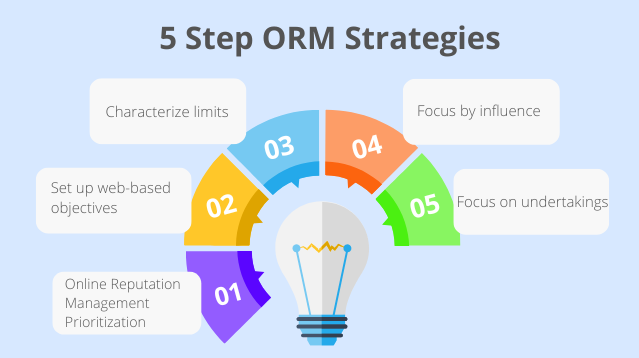In the fast-paced and hyper-connected digital world of 2024, managing your brand’s reputation has never been more critical. The success of your business is closely tied to how your brand is perceived by consumers, and in today’s marketplace, reputation management has become a vital part of any brand strategy. Whether you’re a small start-up or an established enterprise, maintaining a positive reputation can make or break your brand’s future success.
What is Reputation Management?
Brand Reputation management refers to the practice of influencing and controlling the public perception of your brand. It involves actively shaping how your company is seen online and offline, ensuring that customers, stakeholders, and the general public view your brand in a favorable light. A strong reputation is built on trust, transparency, and consistency, while a tarnished reputation can create long-lasting negative effects.
As we continue to move into 2024, the significance of online reputation management has reached new heights. With reviews, social media conversations, and search engine results playing a huge role in consumer decisions, the need to monitor, protect, and enhance your brand’s reputation has become essential.
Why is Reputation Management Important?
There are many reasons why reputation management should be a top priority for your brand in 2024:
- Trust and Credibility: Consumers increasingly rely on online reviews and public opinions before making purchasing decisions. A good reputation fosters trust, which in turn encourages consumers to choose your brand over competitors.
- Competitive Advantage: In a crowded marketplace, reputation management helps differentiate your brand. A solid reputation sets you apart from others, establishing your brand as a leader in your industry.
- Customer Loyalty: A positive reputation is crucial in retaining customers. Loyal customers are more likely to return and even refer your brand to others, helping you build a strong, loyal customer base.
- Revenue Growth: A strong reputation directly impacts business performance, leading to higher sales, more opportunities, and long-term financial success.
With most of this reputation being shaped online, the need for reputation management strategies in 2024 has only grown.
The Role of Reputation Management in 2024

In the digital age, reputation management goes beyond merely responding to negative reviews. It’s a strategic approach that ensures your brand is consistently seen in a positive light across all platforms. It involves monitoring your brand’s presence online, engaging with customers, creating positive content, and managing search engine results.
The main objective of brand reputation management is to influence how your brand is perceived, keeping your public image positive and aligned with your business values. This ongoing process is crucial for long-term success, as digital spaces are constantly evolving, with new platforms and trends emerging.
Key Components of Reputation Management
- Monitoring Your Online Presence: The first step in effective reputation management is tracking what people are saying about your brand. Tools like Google Alerts, social media monitoring, and review platforms help businesses stay on top of online mentions. Regularly monitoring feedback ensures you can act quickly to address any negative comments before they escalate.
- Responding to Feedback: Whether it’s a positive review or a negative one, responding promptly is key. Engaging with customers shows that you value their input and are willing to take action. Negative reviews, in particular, should be handled professionally and politely. A thoughtful response can turn a disgruntled customer into a loyal one, improving your overall reputation.
- Creating Positive Content: Generating content that reflects the best of your brand is a great way to influence public opinion. Regular blog posts, customer success stories, positive press coverage, and engaging social media updates all work to highlight your brand’s strengths. Positive content not only enhances your brand’s image but also helps to push down any negative content on search engine results.
- SEO and Search Engine Management: Search engine optimization (SEO) is crucial to reputation management. By optimizing your content with relevant keywords, you can ensure that positive, brand-enhancing content ranks higher in search results. This reduces the visibility of negative comments or reviews, ensuring that your brand’s online presence remains strong. Reputation management services often include tailored SEO strategies to help boost your positive content.
- Encouraging Reviews: Actively requesting reviews from satisfied customers is an effective strategy for building your reputation. Positive reviews on platforms like Google and social media can significantly influence potential customers. However, it’s important to gather reviews ethically and to engage with all feedback in a respectful manner.
The Risks of Poor Reputation Management
A poor reputation can have severe consequences for your business, especially in 2024:
- Loss of Customers: Negative reviews, comments, or public opinion can drive potential customers away. Once trust is lost, it can be difficult to regain, often leading to customer attrition.
- Decreased Revenue: With fewer customers comes less revenue. A damaged reputation can lead to a decline in sales, affecting your business’s overall financial health.
- Damage to Trust and Credibility: Trust is hard to rebuild once it’s lost. A tarnished reputation erodes credibility, which can impact relationships with your partners, investors, and even your employees.
- Talent Attraction Challenges: Talented professionals are more likely to join companies with a strong reputation. A poor brand image can hinder your ability to attract top talent, stifling growth and innovation.
For these reasons, it’s essential to continually monitor and improve your brand’s reputation, seeking out professional reputation management services to mitigate risks.
Building Long-Term Brand Success

Reputation management is not a one-time task but an ongoing strategy. Establishing and maintaining a strong brand reputation takes time and consistent effort. By staying proactive, monitoring your online presence, addressing feedback, and creating valuable content, you can solidify your brand’s position as a leader in your industry.
In 2024, customers are more informed and connected than ever, meaning your reputation is your most valuable asset. By investing in effective reputation management strategies, your brand can continue to thrive in an increasingly competitive and fast-evolving digital marketplace.
Conclusion
Reputation management is a cornerstone of brand success in 2024. Whether you’re protecting your brand from negative reviews or enhancing your image with positive content, taking a proactive approach is essential. By continuously managing your brand’s online presence, engaging with customers, and leveraging SEO strategies, you can ensure that your brand remains trusted, respected, and successful for years to come.
